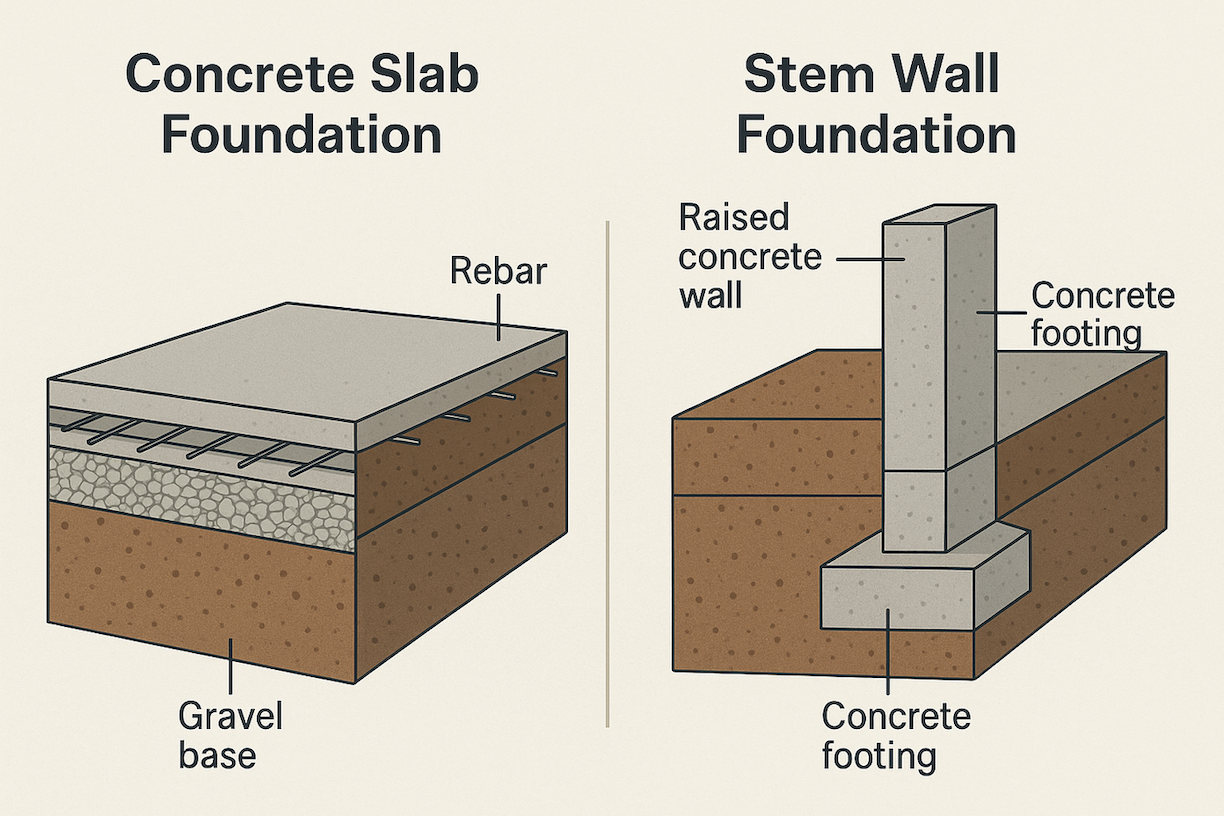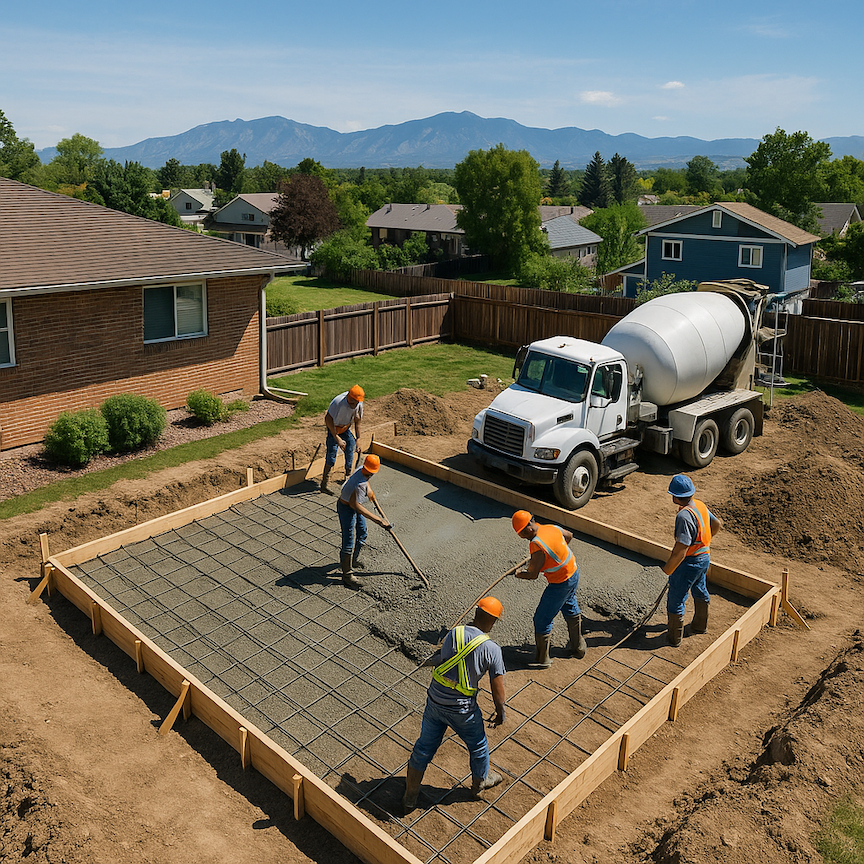Every detached garage project starts with the same critical question: what type of foundation should you build? After constructing over 300 detached garages across the Denver metro area, we’ve learned that your foundation choice determines everything from your project’s initial cost to how well your garage withstands Colorado’s harsh freeze-thaw cycles.
The wrong garage foundation can lead to cracked walls, settling issues, and expensive repairs down the road. However, the right foundation provides decades of reliable service while supporting whatever you decide to store inside. Here’s what you need to know about foundation options for your Colorado detached garage project.
Understanding Colorado’s Unique Foundation Challenges
Colorado’s climate and soil conditions create specific challenges that affect foundation performance. Our expansive clay soils shrink during dry periods and swell when wet, creating movement that can crack poorly designed foundations. Additionally, our temperature swings from below zero to 70+ degrees in the same week put stress on any foundation system.
We also deal with frost lines that extend 30 inches below grade in most Denver-area locations. This means your foundation needs to extend below this depth to prevent frost heaving, which can literally lift and crack your garage floor.
These conditions don’t make foundation work impossible, but they do require proper planning and execution. The good news is that contractors familiar with local conditions know exactly how to build foundations that last.
Concrete Slab Foundations: The Popular Choice
The concrete slab foundation remains our most commonly installed foundation type, representing about 70% of the detached garages we build. This approach involves pouring a single concrete pad that serves as both your foundation and garage floor.
When Slab Foundations Work Best
Slab foundations excel in situations where you have relatively level terrain and stable soil conditions. They work particularly well for standard vehicle storage, workshop spaces, and general storage applications. Most single-car and two-car detached garages use slab foundations successfully.
The installation process starts with excavation to proper depth, followed by gravel base preparation and concrete placement. We typically recommend 5-inch thick slabs with 3,500 PSI concrete for residential detached garages, though thickness may increase based on intended use.
Slab Foundation Specifications
Proper slab construction requires attention to several critical details. The base preparation involves removing organic material and replacing it with compacted gravel, typically 4-6 inches of road base material. This provides stable support and helps with drainage.
Reinforcement comes from either rebar or wire mesh, depending on the application. We prefer rebar for most detached garages because it provides superior crack control. The concrete itself should include fiber reinforcement for additional strength.
Drainage considerations are crucial in Colorado. We always slope slabs away from the building and install perimeter drainage where needed. This prevents water from pooling against the foundation during our intense spring snowmelts.

Stem Wall Foundations: Elevated and Protected
Stem wall foundations combine a concrete footing below frost line with a short wall that elevates your garage floor above grade. This approach costs more than a basic slab but provides several advantages in Colorado conditions.
Advantages of Stem Wall Construction
Elevation above grade protects your garage from water infiltration during heavy snow years. The raised floor also allows for better drainage around the building and provides space for utility connections if needed later.
Stem walls also provide better insulation options. You can insulate the wall itself and create a thermal break between the ground and your garage floor. This makes heated garage spaces much more energy efficient.
The construction process involves digging footings below frost line, pouring concrete footings, building the stem wall (usually 6-8 inches above grade), and then pouring the floor slab on top. While more complex than a basic slab, this approach provides excellent long-term performance.
Cost Considerations for Stem Walls
Expect stem wall foundations to cost 20-30% more than basic slabs due to additional excavation, concrete, and labor. However, this investment often pays dividends in flood-prone areas or locations with drainage challenges.
The additional height also makes it easier to install garage doors properly. Many garage door systems work better when the floor is slightly elevated above the surrounding grade.
Full Basement Foundations: Maximum Versatility
Full basement foundations extend your garage’s usable space significantly by creating a full basement level below the garage floor. While expensive, this approach maximizes your investment when space is at a premium.
When Basements Make Sense
Basement foundations work best on sloping lots where you can walk out from the basement level. They’re also valuable when local zoning limits your building footprint but you need maximum storage space.
The basement space can serve as workshop area, storage for seasonal items, or utility space for heating equipment. Some homeowners even finish basement areas as recreational space or home gyms.
Construction involves full excavation, concrete footings and walls, waterproofing systems, and interior finishing. The complexity means longer project timelines and significantly higher costs, but the space gained often justifies the investment.
Basement Foundation Costs
Full basement foundations typically cost 2-3 times more than slab foundations due to excavation requirements, additional concrete work, and waterproofing needs. However, the square footage gained often makes the cost per square foot competitive with other building options.
Proper waterproofing is essential in Colorado’s clay soils. This includes exterior membrane systems, drain tile installation, and sump pump systems in many cases. Skipping waterproofing steps leads to expensive problems later.
Choosing the Right Garage Foundation for You
Your foundation choice depends on several factors including soil conditions, lot slope, intended use, and budget constraints. Here’s how we help homeowners make this decision.
First, we evaluate soil conditions through visual inspection and sometimes soil testing. Expansive clay soils may require special consideration regardless of foundation type chosen.
Next, we consider drainage patterns and lot slope. Properties with drainage challenges often benefit from elevated foundations, while well-drained lots can accommodate slabs successfully.
Budget obviously plays a role, but we always discuss long-term value rather than just initial cost. A foundation that costs 20% more but lasts decades longer often represents better value.
Finally, we discuss future plans for the space. If you might want to add heating, plumbing, or electrical systems later, certain foundation types accommodate these additions more easily.
Working with Professional Foundation Contractors
Foundation work requires specific expertise, proper equipment, and knowledge of local soil conditions. While some aspects of garage construction lend themselves to DIY approaches, foundations generally don’t.
Professional contractors understand building code requirements, soil conditions, and drainage requirements. They also carry insurance that protects you if something goes wrong during construction.
When selecting a foundation contractor, look for experience with detached garage projects specifically. Ask about their approach to Colorado soil conditions and request references from recent projects.
The investment in professional foundation work pays dividends through decades of reliable service. Poor foundation work creates problems that are expensive and difficult to fix later.
Contact us today to discuss foundation options for your detached garage project. Our team brings decades of experience with Colorado soil conditions and local building requirements to ensure your garage foundation provides reliable service for decades to come.
